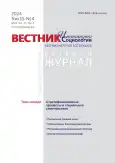Vol 15, No 4 (2024)
About the Issue
Reality and сonstruct in Russian society
 10-15
10-15


Theme of the issue: Stratification processes and social well-being
The Middle Class in Modern Russia: Has the Theoretical Construction Become a Reality?
Abstract
The article examines three perspectives of studying the middle class in modern Russia. The first perspective is presented as a brief excursion into the history of the development of middle class studies in the post-Soviet period. The second perspective is devoted to the consideration of methodological issues of studying the middle class, the criteria for its identification in the social structure of Russian society and the definition on this basis of the quantitative characteristics of the middle class. The third perspective is presented by the results of the analysis of the middle class in accordance with the author's methodology of its identification by three criteria - material standard of living, education and self-identification with the middle class. The methodology is applied to the analysis of the middle class using data from the all-Russian monitoring conducted by the Center for the Study of Sociocultural Changes of the Institute of Philosophy of the Russian Academy of Sciences from 1990 to the present day. It allows us to trace the dynamics of the middle class in the post-Soviet period, its composition by professional characteristics, by areas of employment, by strategies in labour activity and other aspects. The latest wave of monitoring (summer 2023) focused on the population's attitude to the choice of the path the country should take and the respondent's self-identification with a particular model of Russia's development. The middle class in its majority (67%) chose a special Russian path of development for the country and for themselves personally, practically rejecting the path followed by Western societies, developed Muslim countries and China. At the same time, in second place (30%) we find the opinion that Russia should use all the best experience of other countries. At the same time, respondents declared themselves to be supporters of democratic forms of government, insist on the observance of human rights and freedoms, primarily in the economic and social spheres, as the closest to the everyday interests of people. The results of the study concluded that the majority of Russians, and especially the middle class, understand the original path for Russia as the path of a sovereign state based on traditional and humanitarian values, and does not at all mean a desire to live in a traditional society that has lost many of its features under the influence of decades of modernisation.
 16-33
16-33


Objective and Subjective Poverty in Russia: What the Last 20 Years Have Brought
Abstract
 34-59
34-59


Specificity of Subjective Well-Being of Russians from Different Types of Settlements
Abstract
 60-81
60-81


Russians' perceptions of key components of the quality of life and social justice: a cross-section of public opinion in 2024.
Abstract
 82-109
82-109


Preparing Russians for Retirement from the Perspective of the Active Longevity Concept (Based on the Yaroslavl Region)
Abstract
 110-132
110-132


The role of the “third sector” in the political careers of men and women in Russia
Abstract
 133-154
133-154


Problems of social integration
Citizens' Perception of Historical Justice in the Modern Socio-Cultural and Political Contexts
Abstract
 155-170
155-170


Migration Policy in the Nizhny Novgorod Region: Subjects and Management Practices
Abstract
 171-191
171-191


Risks of social metamorphosis
On the Relationship Between Emotional Intelligence and Personality Traits with Attitudes Toward a Sensitive Topic (Using the Problem of Domestic Violence as an Example)
Abstract
 192-212
192-212


Peculiarities of motivations of IT specialists in crisis conditions
Abstract
 213-234
213-234


Development of the Information and Network Environment and Deviant Behaviour: Cybercrime as a New Social Threat
Abstract
 235-254
235-254


Protest Consciousness and Protest Culture of the Young People of the Russian Far East
Abstract
 255-281
255-281


Sociology of Science
Scientific Supervisor and Scientific Mentor: Updating Old Roles and Meanings
Abstract
 282-302
282-302


Cinema as a Subject of Sociological Reflection: Analysis of Scientific Publications
Abstract
 303-323
303-323


Topic of the Issue: Sociology of Religion
Russian Buddhism, Traditional Values, and the Public Media Sphere
Abstract
 324-344
324-344


From the sociologist's desk
Peculiarities of Public Spaces Perception by Muscovites with Limited Mobility (Based on Two Urban Locations)
Abstract
 345-357
345-357











